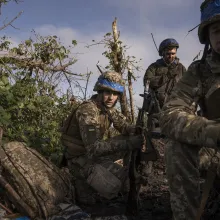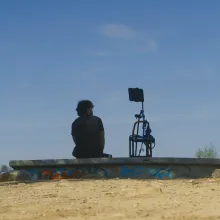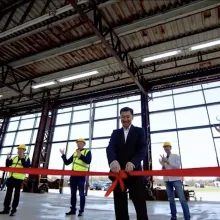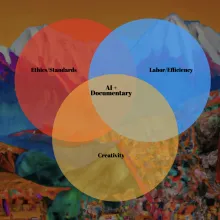In this interview, Mstyslav Chernov discusses how he transformed war reporting into immersive cinema in 2000 Meters to Andriivka
Doc Tech
Revolutionary! Magical! Game-changing! These are some of the words being used to describe the results of AI-generated upscaling tools for archival and low-resolution footage. Some documentarians have turned to Video AI from Topaz Labs, a software featuring a suite of 30-plus AI models for video enhancement. To learn more about Video AI and the future of AI-assisted video upscaling, Documentary interviewed the Topaz CEO and Co-founder Eric Yang.
When making Deepfaking Sam Altman (2025), documentary director Adam Bhala Lough (Telemarketers) found himself in deep doo doo. Despite months of trying, he still hadn’t gotten access to an interview with Sam Altman (CEO of OpenAI) for a film Lough had promised about AI. So he took a page from Altman’s own MO. The resulting film follows Lough setting about on his journey, working with deepfakers in India, meeting with lawyers, and ultimately spending a lot of time chatting and bonding with the resulting AI chatbot, called SamBot. For this edition of The Synthesis, we spoke with Lough about the film, his use of AI, and its implications for documentary.
In a recent joint submission to a call for contributions on AI and Creativity at the United Nations Human Rights Council Advisory Committee, WITNESS, the Co-Creation Studio at MIT, and the Archival Producers Alliance (APA) outlined these pressing dangers. Drawing from years of frontline research, workshops, and advocacy with creative communities and human rights defenders around the world, we identified seven core threats AI poses to human creativity.
Sora, a new generative AI video tool from Open AI, is named after the Japanese word for sky. Is the sky the limit? Last year, the company gave early access to 300 artists, some of whom later denounced the company’s product release as artwashing. OpenAI responded with a series of exclusive promotional screenings of artist-made films for industry executives in New York, Los Angeles, and Tokyo. What might this all mean for the documentary field? We decided to run our own experiment. To test the limits of Sora, we prompted it with the taglines from the six most recent Oscar-winning documentaries. We showed the resulting 15-second silent clips to a panel of seven documentary luminaries over Zoom.
Welcome to The Synthesis, a new monthly column exploring the intersection of Artificial Intelligence and documentary practice. Over the next year, co-authors shirin anlen and Kat Cizek will lay out ten (or so) key takeaways that synthesize the latest intelligence on synthetic media and AI tools—alongside their implications for nonfiction mediamaking. Balancing ethical, labor, and creative concerns, they will engage Documentary readers with interviews, analysis, and case studies. The Synthesis is part of an ongoing collaboration between the Co-Creation Studio at MIT’s Open Doc Lab and WITNESS.
"Block Party": Veteran game developers Navid and Vassiliki Khonsari of iNK Stories are building an open world that reflects their own community of Brooklyn, NYC, populating it with AI-powered NPC avatars in the likeness of the duo’s real-life neighbors. Documentary spoke to the duo about this experiment and its profound implications for the documentary field.
In our bid to make this 40th anniversary issue somewhat of a time capsule, we asked our members to send in photographs—new and old—with the cameras
In 2018, a junior soccer team and their assistant coach went into a nearby cave in Thailand’s Chiang Rai province. It was a week before the cave was
"You never forget your first time seeing a whale," director Joshua Zeman says in The Loneliest Whale: The Search for 52. His was as a kid working on a














